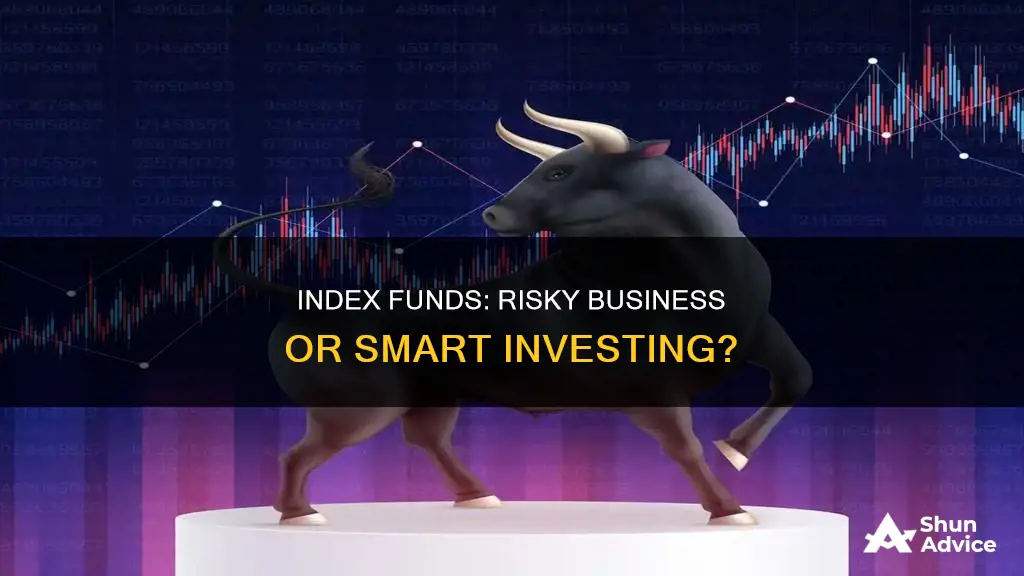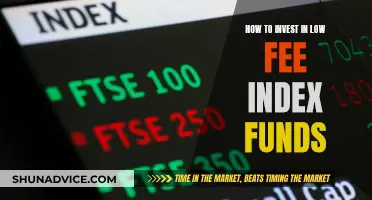
Index funds are a popular investment choice as they offer the potential for stable long-term returns, a diversified portfolio, and low fees. However, they may not be suitable for everyone. Firstly, index funds are designed to match the stock market's performance, so if your goal is to beat the market, hand-picking individual stocks may be a better strategy. Secondly, with index funds, you don't have control over the specific investments within the fund, which may be a disadvantage if you have particular stocks you want to avoid. Lastly, if you have the knowledge and confidence to research and select stocks individually across various sectors, you may be able to achieve greater diversification and potentially higher returns without relying on index funds. Therefore, while index funds offer a convenient and relatively safe investment option, they may not be the best choice for investors seeking to maximize returns, control their investments, or build a highly customized portfolio.
| Characteristics | Values |
|---|---|
| Control over investments | Index funds do not allow investors to have a say in what goes into them. |
| Beating the market | Index funds are designed to match the stock market's performance, not beat it. |
| Diversification | If you are confident in your ability to research stocks individually, you may not need index funds. |
| Returns | Index funds may not be suitable if you are looking for significant annual returns or short-term gains. |
| Risk | Index funds are less affected by a declining singular asset but are vulnerable to fluctuations in the larger market. |
What You'll Learn

You want to beat the market
If you want to beat the market, index funds are not the investment vehicle for you. Index funds are designed to match the market's performance or that of a specific benchmark index. This means that, by definition, index funds cannot beat the market.
Index funds are passively managed, meaning that they do not require active decision-making about which investments to buy or sell. Instead, they aim to replicate the performance of a particular stock market index, such as the S&P 500 or the Dow Jones Industrial Average. As a result, index funds tend to have lower fees than actively managed funds.
Actively managed funds, on the other hand, aim to outperform the market by investing in a portfolio of carefully selected stocks. While these funds often come with higher fees, they offer the potential for above-market returns.
It is worth noting that actively managed funds rarely beat the market over the long term. According to SPIVA, only 9% of actively managed funds continued to beat their benchmark in 2021 after outperforming in 2019.
If you are seeking to beat the market, you may want to consider actively managed funds or investing in individual stocks. However, it is important to remember that actively investing carries a higher risk of loss compared to the passive strategy employed by index funds.
Best Direct Mutual Fund Investment Apps: Your Guide
You may want to see also

You want control over your investments
Index funds are set portfolios, meaning investors have no control over the individual holdings in the portfolio. This means that investors cannot pick and choose the individual investments that comprise an index fund. If an investor has specific companies they like and want to own, such as a favourite bank or food company, they cannot do this via an index fund. They would have to invest in the companies individually.
Similarly, if an investor has ill feelings towards certain companies for moral or other personal reasons, they would still have to invest in them if they were part of a certain index fund. In this case, the investor's only option would be to not invest in any index fund that includes the company they disagree with.
Some investors might find it frustrating not being able to remove investments from the fund that they don't like. For example, if an investor has issues with the way a company treats the environment or the products it makes, they may not want to invest in that company. However, if that company is included in an index fund, the investor cannot choose to remove it from the fund.
Another drawback of index funds is that they prevent investors from seizing opportunities elsewhere. Index funds do not allow for advantageous behaviour. If a stock becomes overvalued, it will carry more weight in the index. This is when astute investors would want to lower their portfolios' exposure to that stock. However, if an investor is solely investing through an index, they will not be able to act on this knowledge.
Overall, the lack of control over holdings in index funds can be a significant disadvantage for investors who want to have a more hands-on approach to their investments and have specific companies or sectors they want to invest in or avoid.
Investing in Funds: Diversification, Expertise, and Access
You may want to see also

You can diversify on your own
One of the main benefits of index funds is that they offer instant diversification with little effort. However, if you are confident in your ability to research stocks individually and build a suitable mix on your own, you may not need index funds.
Index funds are passively managed, meaning fund managers take a hands-off approach and invest in companies in the market index it follows. On the other hand, active management requires managers to be more involved in researching and choosing which funds to invest in. The benefit of active management is that you have control over your investments. With index funds, you don't get a say in what goes into them.
Building your own investment portfolio gives you the freedom to choose individual stocks or mutual funds that are likely to outperform major indexes. However, it is important to note that this approach requires significant time and effort in researching and analysing stocks from a wide array of market sectors.
Additionally, attempting to build a similarly diversified portfolio on your own would require substantial time and money. Index funds provide instant access to a large collection of stocks, bonds, or other securities, which dilutes your risk. While some indexes are not diversified and focus on a specific industry or sector, many index funds track large sections of the market, providing broad diversification.
Ultimately, if you have the knowledge, skill, and time to assemble your own portfolio, you may achieve better returns than with index funds. There is also a sense of pride and accomplishment in successfully building and managing your own investment mix.
Vanguard Funds: Best Investment Options for Your Portfolio
You may want to see also

You want higher returns
Index funds are a passive investment strategy that tracks a market index, such as the S&P 500. They are designed to match the performance of the index, rather than trying to beat the market. While this means that index funds are a lower-risk option, it also means that they are limited in their ability to generate higher returns. Here are some reasons why investing in index funds may not be the best option if you are seeking higher returns:
Lack of Downside Protection
Index funds do not provide protection against market corrections and crashes. When the market is performing well, investors in index funds will benefit from the upside. However, they are also fully exposed to the downside during market downturns. This lack of downside protection can result in significant losses if the market experiences a prolonged decline.
Lack of Reactive Ability
Index investing does not allow for advantageous behaviour. If a stock becomes overvalued, it carries more weight in the index, which is the opposite of what astute investors would want. With index funds, you do not have the flexibility to lower your exposure to overvalued stocks or take advantage of undervalued stocks.
Limited Exposure to Different Strategies
Index funds are limited to a single strategy of tracking a specific market index. This means that investors miss out on the opportunity to implement other successful investment strategies. By conducting research and combining different strategies, investors may be able to achieve better risk-adjusted returns than what is possible with index funds alone.
Lack of Control Over Holdings
Index funds are set portfolios, and investors have no control over the individual holdings. This lack of control may be undesirable for investors who want to own specific companies that they have researched and believe in, or who want to avoid investing in certain companies for moral or personal reasons.
No Chance to Beat the Market
Index funds are designed to match the market's performance, rather than outperform it. If you are seeking higher returns, you may prefer active investment strategies that aim to beat the market. While it is challenging to consistently outperform the market, there are exceptional managers who have successfully done so over the long term.
Mutual Funds: Best International Investment Opportunities
You may want to see also

You want quick adjustments for short-term gains
Index funds are passively managed investments, meaning they are designed to mirror the performance of a specific market index. This means that they are not suitable for investors seeking to make quick adjustments for short-term gains. Here are some reasons why index funds are not ideal for those seeking short-term gains:
- Lack of Reactive Ability: Index funds do not allow for advantageous behaviour. If a stock becomes overvalued, it carries more weight in the index. However, this is when investors would typically want to lower their exposure to that stock. With index funds, investors cannot act on this knowledge and make quick adjustments.
- No Control Over Holdings: Index funds are set portfolios, and investors have no control over the individual holdings. This means that investors cannot make quick adjustments to their portfolio by choosing specific stocks they believe will perform well in the short term.
- Fewer Opportunities for Short-Term Growth: Index funds are typically considered long-term investments and are not designed for short-term gains. The passive management style of index funds means there is little chance to make quick adjustments and realise significant short-term gains.
- Lack of Downside Protection: Index funds can perform poorly during prolonged downtrends in the market. They do not provide protection from market corrections and crashes when an investor has significant exposure to stock index funds.
- Moderate Annual Returns: Index funds that hold a large number of assets tend to provide immense diversification but dilute the possibility of achieving significant annual returns. This means that investors seeking high short-term gains may be disappointed.
Funding Connection: The Superior Investment Strategy Over Funding Capture
You may want to see also
Frequently asked questions
Index funds are designed to match the market's performance, so if your goal is to beat the market, then index funds are not the right choice for you.
When you buy index funds, you don't get a say in what goes into them.
One major benefit of index funds is that by adding them to your portfolio, you automatically get a diverse mix of stocks. However, if you feel confident in your ability to research stocks individually from a wide array of market sectors and amass a suitable mix on your own, then there may not be a need for you to fall back on index funds.
A single index fund can hold hundreds or even thousands of assets. The diversification such large funds provide is immense, but its size also dilutes the possibility of achieving significant annual returns.
Index funds are passively managed, so there's little chance to make quick adjustments and realise significant short-term gains.







